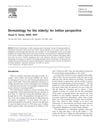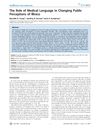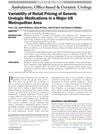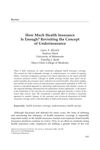 July 2008 in “Baylor University Medical Center Proceedings”
July 2008 in “Baylor University Medical Center Proceedings” Global oil use will rise, US corn-to-ethanol policy is flawed, and various social and economic issues need attention.
 116 citations,
December 2017 in “International Journal of Women's Dermatology”
116 citations,
December 2017 in “International Journal of Women's Dermatology” Adult female acne treatment should be personalized, considering individual preferences and pregnancy, using various topical and oral medications while managing side effects and resistance.
 3 citations,
January 2011 in “Clinics in Dermatology”
3 citations,
January 2011 in “Clinics in Dermatology” The paper concludes that elderly in India face unique skin challenges and need better dermatological care and awareness.
 47 citations,
February 2019 in “Journal of The American Academy of Dermatology”
47 citations,
February 2019 in “Journal of The American Academy of Dermatology” LGBT individuals have unique skin health needs, including higher STD risks and side effects from gender-affirming treatments, requiring dermatologists to offer knowledgeable and culturally competent care.
 55 citations,
October 2003 in “Dermatologic Clinics”
55 citations,
October 2003 in “Dermatologic Clinics” Different hair care practices and conditions affect African American hair and scalp health, requiring specialized knowledge for treatment.
 373 citations,
September 2009 in “Obstetrics & Gynecology”
373 citations,
September 2009 in “Obstetrics & Gynecology” The bulletin provides guidelines for diagnosing and managing PCOS, suggesting weight loss, hormonal contraceptives, and diabetes screening, with clomiphene for infertility and various treatments for excess hair.
 43 citations,
December 2008 in “PLOS ONE”
43 citations,
December 2008 in “PLOS ONE” Medical terms make new health issues seem more serious but don't affect views on well-known conditions.
 3 citations,
March 2016 in “Phytotherapy Research”
3 citations,
March 2016 in “Phytotherapy Research” The new compound was more effective than finasteride in reducing markers of hair loss and prostate issues in cell tests.
 5 citations,
August 2018 in “Urology”
5 citations,
August 2018 in “Urology” Independent pharmacies generally offer lower prices for certain generic urologic medications than chain pharmacies.
 40 citations,
November 2009 in “Experimental Dermatology”
40 citations,
November 2009 in “Experimental Dermatology” The mineralocorticoid receptor may play a role in skin and hair health and could be a new target for treating related disorders.
 254 citations,
September 2014 in “Menopause”
254 citations,
September 2014 in “Menopause” The NAMS 2014 recommendations guide healthcare providers on treating health issues in midlife women, emphasizing individualized care and informed decision-making.
 December 2024 in “Journal of Population Therapeutics and Clinical Pharmacology”
December 2024 in “Journal of Population Therapeutics and Clinical Pharmacology” Rosemary and kalonji seeds can improve hair health and treat hair conditions.
 36 citations,
November 2006 in “Medical Care Research and Review”
36 citations,
November 2006 in “Medical Care Research and Review” The document concludes that there is no clear definition of adequate health insurance, and a consistent method to measure underinsurance is needed.
27 citations,
January 2015 in “International Journal of Trichology” The supplement helps improve hair growth and reduce hair shedding.
 19 citations,
December 2018 in “Experimental and Molecular Medicine”
19 citations,
December 2018 in “Experimental and Molecular Medicine” Small molecule IM boosts hair growth by changing stem cell metabolism.

Recombinant human growth hormone helps burn wounds heal faster by increasing blood vessel growth.
 244 citations,
September 2008 in “Annual Review of Genomics and Human Genetics”
244 citations,
September 2008 in “Annual Review of Genomics and Human Genetics” The document concludes that the fast-growing direct-to-consumer genetic testing market lacks sufficient regulation, posing risks to consumers due to questionable test quality and accuracy.
 27 citations,
March 2013 in “Social Semiotics”
27 citations,
March 2013 in “Social Semiotics” Commercial hair loss websites promote Propecia by making men feel insecure about baldness and suggesting it's a medical issue needing treatment.
 4 citations,
October 2016
4 citations,
October 2016 Herbs like aloe vera and amla are effective and safe for treating hair loss.
 29 citations,
May 1998 in “Bulletin of the American College of Nurse-Midwifery”
29 citations,
May 1998 in “Bulletin of the American College of Nurse-Midwifery” The document concludes that menopause should be seen as a natural part of aging and managed with personalized care and informed choices.
 May 2024 in “Journal of functional foods”
May 2024 in “Journal of functional foods” Coffee bean residue extract helps hair growth by activating cell processes.
 15 citations,
February 2017 in “Nursing Clinics of North America”
15 citations,
February 2017 in “Nursing Clinics of North America” Targeted cancer therapies can cause skin side effects, which should be treated early to help patients' quality of life and treatment adherence.
 January 2024 in “Acta Facultatis Medicae Naissensis”
January 2024 in “Acta Facultatis Medicae Naissensis” Cosmeceuticals are important for managing skin issues during the COVID-19 pandemic.
 8 citations,
January 2017 in “Fertility and Sterility”
8 citations,
January 2017 in “Fertility and Sterility” Urologic diseases and treatments in older men can negatively affect fertility, and doctors should talk to patients about this.
 27 citations,
August 2015 in “Journal of Investigative Dermatology”
27 citations,
August 2015 in “Journal of Investigative Dermatology” The document concludes that there is a significant lack of reporting on the sex and age of cells in skin research, which could affect clinical trials and treatments.
14 citations,
January 2020 in “Women's health reports” Iron deficiency in menstruating women causes many health issues beyond anemia and needs early detection and treatment.
4 citations,
November 2017 in “PubMed” Miracle fruit seed oil significantly reduces hair breakage in women with damaged hair.
 4 citations,
August 2016 in “Australasian Journal of Dermatology”
4 citations,
August 2016 in “Australasian Journal of Dermatology” Hair loss is linked to insulin resistance in women, regardless of hormone levels.
 August 2013 in “Pharmacy Today”
August 2013 in “Pharmacy Today” Viviscal may modestly improve hair loss in women without adverse effects.
 3 citations,
January 2005 in “Media Asia”
3 citations,
January 2005 in “Media Asia” Advertising in China shifted towards entertainment, favored local brands, and played a significant role in the country's move to a consumer economy.



























